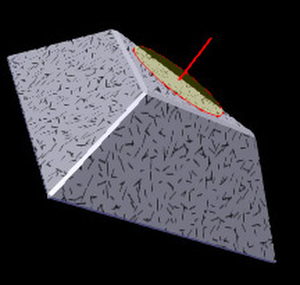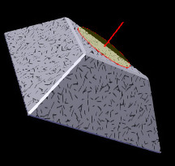Information
- Publication Type: Journal Paper (without talk)
- Workgroup(s)/Project(s):
- Date: July 2016
- Journal: IEEE Computer Graphics and Applications
- Number: 4
- Volume: 36
- Pages: 56 – 66
- Keywords: computer graphics, gauge-figure task, perceptual visualization, shape perception
Abstract
The gauge-figure task (GFT) is a widespread method used to study surface perception for evaluating rendering and visualization techniques. The authors investigate how accurately slant angles probed on well-defined objects align with the ground truth (GT) in monoscopic and stereoscopic displays. Their results show that the GFT probes taken with well-defined objects align well with the GT in the all-monoscopic and all-stereoscopic conditions. However, they found that a GF rendered in stereo over a monoscopic stimulus results in a strong slant underestimation and that an overestimation occurred in the inverse case (monoscopic GF andstereoscopic stimulus). They discuss how their findings affect the interpretation of absolute GFT measures, compared to the GT normal.Additional Files and Images
Weblinks
BibTeX
@article{bernhard-2016-gft,
title = " The Accuracy of Gauge-Figure Tasks in Monoscopic and Stereo
Displays",
author = "Matthias Bernhard and Manuela Waldner and Pascal Plank and
Veronika Solteszova and Ivan Viola",
year = "2016",
abstract = "The gauge-figure task (GFT) is a widespread method used to
study surface perception for evaluating rendering and
visualization techniques. The authors investigate how
accurately slant angles probed on well-defined objects align
with the ground truth (GT) in monoscopic and stereoscopic
displays. Their results show that the GFT probes taken with
well-defined objects align well with the GT in the
all-monoscopic and all-stereoscopic conditions. However,
they found that a GF rendered in stereo over a monoscopic
stimulus results in a strong slant underestimation and that
an overestimation occurred in the inverse case (monoscopic
GF andstereoscopic stimulus). They discuss how their
findings affect the interpretation of absolute GFT measures,
compared to the GT normal.",
month = jul,
journal = "IEEE Computer Graphics and Applications",
number = "4",
volume = "36",
pages = "56--66",
keywords = "computer graphics, gauge-figure task, perceptual
visualization, shape perception",
URL = "https://www.cg.tuwien.ac.at/research/publications/2016/bernhard-2016-gft/",
}


